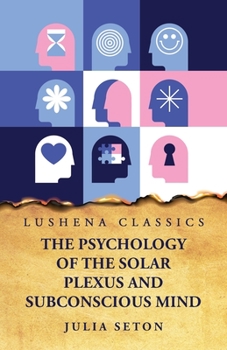The Psychology of the Solar Plexus and Subconscious Mind
Select Format
Select Condition 
Book Overview
Table of contents: (1) The Psychology of the Solar Plexus (2) Centers of Being (3) Conscious Union of the Centers of Being (4) The Subconscious Mind (5) Directions for Linking the Objective Mind and the Solar Center. This is a black-and-white facsimile reprint of the 1914 edition. Although it has been checked manually, it may contain imperfections such as marks, notations, marginalia and flawed pages.
Format:Paperback
Language:English
ISBN:B0CF7SM2PC
ISBN13:9798890962485
Release Date:August 2023
Publisher:Lushena Books
Length:48 Pages
Weight:0.15 lbs.
Dimensions:0.1" x 5.5" x 8.5"
Customer Reviews
11 customer ratings | 4 reviews
There are currently no reviews. Be the first to review this work.




















